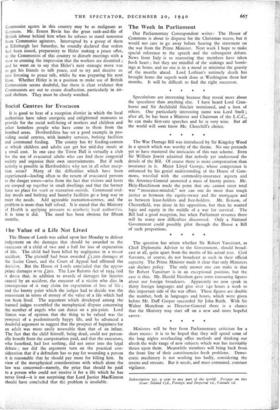1 he Value of a Life Not Lived
The House of Lords was called upon last Monday to deliver judgement on the damages that should be awarded to the executors of a child of two and a half for loss of expectation of life. The child had been killed by negligence in a motor accident. The plaintiff had been awarded £1,200 damages at the Assize Court, and the Court of Appeal had affirmed the decision. But the House of Lords concluded that the appro- priate damages vv.re £200. The Law Reform Act of 1934 laid it down that, in addition to awards of damages for injuries caused by an accident, the executor of a victim who dies in consequence of it may claim for expectation of loss of life ; and the knotty point which the judges had to decide was the assessment in terms of money of the value of a life which had not been lived. The argument which developed among the learned judges resembled the metaphysical dispute concerning the number of angels who can dance on a pin-point. Lord Simon was of opinion that the thing to be valued was the prospect of a predominantly happy life, and he advanced a doubtful argument to suggest that the prospect of happiness for an adult was more easily assessable than that of an infant. The fact that the child himself, being dead, could not person- ally benefit from the compensation paid, and that the executors, who benefited, had lost nothing, did not enter into the legal debate ; nor did the argument turn on the practical con- sideration that if a defendant has to pay for wounding a person it is reasonable that he should pay more for killing him. In view of the metaphysical considerations with which alone the law was concerned—namely, the price that should be paid to a person who could not receive it for a life which he has never lived—it is not surprising that Lord Justice MacKinnon should have concluded that the problem is insoluble.


























 Previous page
Previous page